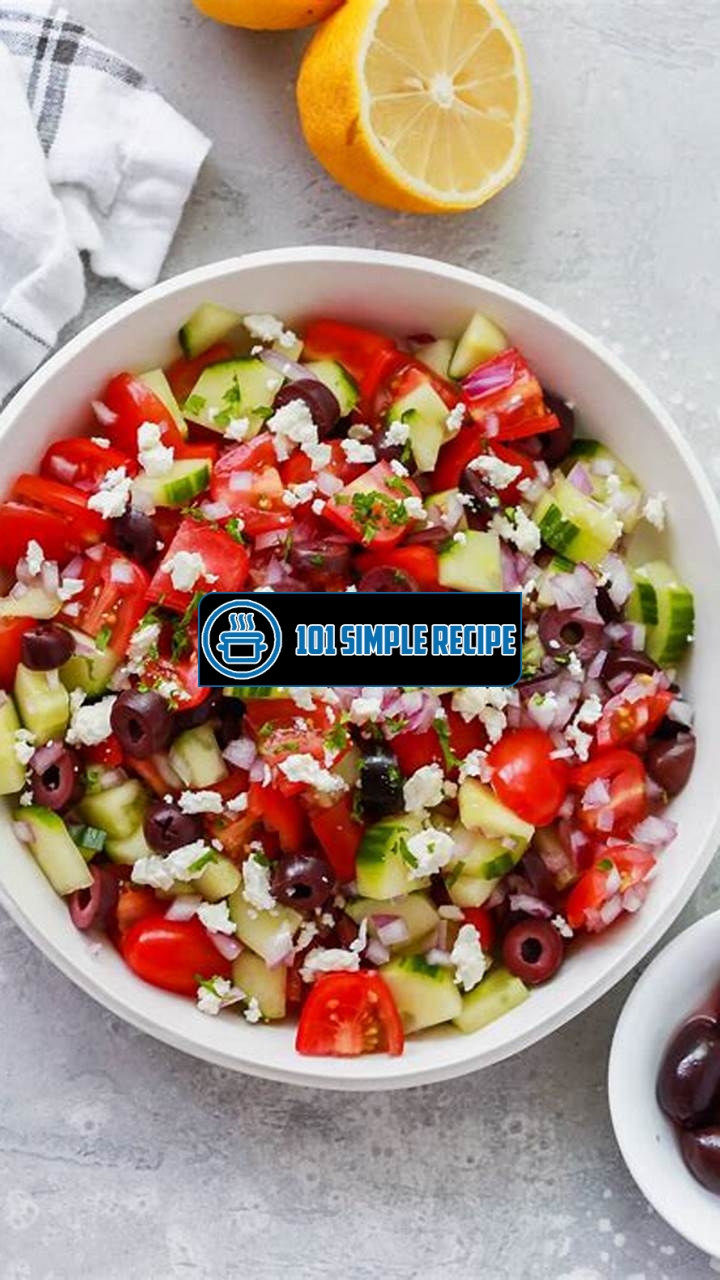If you’re craving a light and refreshing meal, look no further than the perfect Mediterranean salad. Bursting with fresh ingredients and bold flavors, this culinary creation will transport you to the sunny beaches of Greece or the vibrant markets of Morocco. With its combination of crisp vegetables, tangy olives, creamy feta cheese, and zesty vinaigrette, every bite is a tantalizing explosion of taste. Whether you’re a seasoned chef or a beginner in the kitchen, this salad is incredibly easy to assemble and can be customized to suit your preferences. So put on your apron, grab your cutting board, and get ready to dive into a delicious adventure.

Mediterranean Salad: A Refreshing and Nutritious Dish
Discover the flavors and health benefits of the Mediterranean salad, a vibrant dish packed with fresh ingredients and essential nutrients. The Mediterranean diet is renowned for its emphasis on fresh produce, lean proteins, and heart-healthy fats. The Mediterranean salad is a delicious representation of this diet, incorporating a variety of flavors and textures to create a refreshing and nutritious dish.
Exploring Mediterranean Cuisine
The Mediterranean region, encompassing countries like Greece, Italy, and Spain, is renowned for its rich culinary traditions. Mediterranean cuisine is characterized by its abundant use of fresh fruits and vegetables, whole grains, legumes, lean proteins, and healthy fats, such as olive oil. This balanced and nutrient-dense diet has been associated with numerous health benefits, including reduced risk of heart disease, improved brain function, and increased longevity.
Incorporating the flavors of the Mediterranean, the Mediterranean salad showcases the vibrant and diverse ingredients found in this region. From juicy tomatoes to crisp cucumbers, tangy olives to savory feta cheese, every bite is a burst of Mediterranean goodness.
The Key Components of a Mediterranean Salad
A Mediterranean salad typically consists of a variety of colorful vegetables, protein sources, grains, and a flavorful dressing. Here are the key components that make up this tantalizing dish:
- Fresh Vegetables: Start with a base of fresh vegetables like tomatoes, cucumbers, bell peppers, and red onions. These vegetables not only add vibrant colors but also provide essential vitamins, minerals, and antioxidants.
- Protein Sources: To make your salad more satisfying and nutritious, include protein sources such as grilled chicken, chickpeas, feta cheese, or canned tuna. These ingredients provide a boost of protein, which helps to keep you feeling full and supports muscle health.
- Grains and Legumes: Incorporating grains like quinoa or bulgur and legumes such as lentils or beans adds a hearty texture and a dose of fiber to your salad. These ingredients also provide complex carbohydrates, which supply energy to fuel your day.
- Flavorful Dressing: The dressing is what ties all the components together and adds a burst of flavor to the salad. Opt for a homemade dressing made with fresh lemon juice, extra-virgin olive oil, minced garlic, and a variety of herbs and spices. This dressing enhances the taste of the salad while also providing the health benefits of olive oil.
Remember to be creative and customize your salad with your favorite Mediterranean ingredients!
Choosing the Perfect Greens
When it comes to choosing the perfect greens for your Mediterranean salad, there are a plethora of options to consider. While traditional Mediterranean salads often feature crisp romaine lettuce, feel free to experiment with different types of greens to add variety and nutrition to your dish.
Spinach and arugula are excellent options that provide a slightly peppery taste and are packed with vitamins and minerals. Kale, with its robust flavor and nutrient density, can also be a great addition to your salad.
Alternatively, you can mix and match different types of greens to create a unique flavor profile. Try combining romaine lettuce with baby spinach or arugula for a delightful contrast of textures and flavors.
Don’t forget to wash and thoroughly dry your greens before adding them to your salad. This ensures optimal freshness and crunchiness!
By incorporating the vibrant flavors and wholesome ingredients of the Mediterranean diet, you can create a delicious and nutritious salad that not only satisfies your taste buds but also nourishes your body. So gather your favorite Mediterranean ingredients, get creative, and enjoy the refreshing goodness of a homemade Mediterranean salad!
Mediterranean salad recipe is a popular and delicious dish that combines fresh vegetables and herbs with tangy dressings.
The Mediterranean Diet: A Path to Good Health
Uncover the numerous health advantages of incorporating Mediterranean salads into your diet, promoting heart health, weight management, and overall well-being.
Heart-Healthy Fats and Oils
Heart-healthy fats and oils are a key aspect of the Mediterranean diet and are essential for creating a delicious Mediterranean salad. Incorporating these fats into your diet can lead to a range of health benefits, including a reduced risk of heart disease. Olive oil, a staple in Mediterranean cuisine, is rich in monounsaturated fats, which have been shown to lower LDL (bad) cholesterol levels and reduce the risk of cardiovascular events. Other sources of heart-healthy fats include avocado, nuts, and seeds.
Avocado, one of the heart-healthy fats, is not only delicious but also packed with nutrients. It is a great source of monounsaturated fats, which can help lower LDL cholesterol levels. Additionally, avocados are high in vitamins and minerals, such as vitamin K, vitamin E, potassium, and magnesium, which are important for maintaining overall health.
Nutrient-Rich Vegetables and Fruits
Incorporating a variety of nutrient-rich vegetables and fruits into your Mediterranean salad is essential for obtaining the full range of health benefits associated with this diet. Vegetables like leafy greens, tomatoes, cucumbers, bell peppers, and onions are not only flavorful but also provide essential vitamins, minerals, and dietary fiber. Fruits like oranges, grapes, and pomegranates add a touch of sweetness and provide additional nutrients and antioxidants.
Leafy greens such as spinach, kale, and arugula are packed with vitamins A, C, and K. These nutrients can help boost your immune system and improve bone health. Additionally, leafy greens are rich in fiber, which aids in digestion and supports weight management.
Tomatoes are another important component of a Mediterranean salad. They are an excellent source of vitamin C, which is a powerful antioxidant that helps protect the body against oxidative stress. Tomatoes are also rich in lycopene, a natural pigment that has been linked to a reduced risk of certain types of cancer.
The Role of Whole Grains
Whole grains play a vital role in the Mediterranean diet and should not be overlooked when creating the perfect Mediterranean salad. Whole grains such as bulgur, quinoa, and whole wheat couscous provide essential nutrients, including fiber, B vitamins, and minerals like magnesium and selenium.
Including whole grains in your diet can help promote weight management and reduce the risk of chronic diseases such as heart disease and type 2 diabetes. Whole grains have a lower glycemic index compared to refined grains, which means they cause a slower rise in blood sugar levels. This can help regulate your appetite and prevent spikes in blood sugar levels.
Whole grains also provide a good source of energy and can help you feel fuller for longer. This can be beneficial for weight management and reducing the risk of overeating.
By incorporating heart-healthy fats and oils, nutrient-rich vegetables and fruits, and whole grains into your Mediterranean salad, you can create a dish that not only tastes great but also promotes good health. So go ahead and enjoy the flavors of the Mediterranean while taking care of your body!
Delicious Mediterranean Salad Variations
If you’re a fan of fresh, vibrant flavors and healthy eating, then Mediterranean salads are a must-try for you. These salads combine the best of Mediterranean cuisine, showcasing unique ingredients and flavor profiles from different regions. Whether you’re a fan of the classic Greek salad, the refreshing Italian Caprese salad, or the fusion of flavors in Moroccan couscous salad, there’s a Mediterranean salad variation to suit every taste and occasion.
Classic Greek Salad: A Mediterranean Icon
When it comes to Mediterranean salads, the classic Greek salad is an undisputed icon. Packed with fresh ingredients and bursting with flavor, this salad is a favorite amongst salad enthusiasts. The traditional Greek salad typically features crisp romaine lettuce, juicy tomatoes, cucumbers, red onions, tangy Kalamata olives, and creamy feta cheese. It is dressed with a simple yet delicious combination of olive oil, lemon juice, and oregano. The combination of these ingredients and the homemade dressing creates a harmonious blend of flavors that will transport your taste buds to the Mediterranean coast.
Tip: To add a twist to the classic Greek salad, you can try adding some grilled chicken or shrimp for extra protein. You can also toss in some roasted red peppers or artichoke hearts for an added burst of flavor.
Italian Caprese Salad: A Burst of Freshness
If you’re craving a salad that is light, refreshing, and packed with the flavors of Italy, then the Caprese salad is perfect for you. This simple yet elegant salad features ripe tomatoes, fresh mozzarella cheese, and fragrant basil leaves, seasoned with salt, black pepper, and a drizzle of balsamic glaze or extra virgin olive oil. The combination of these ingredients creates a beautiful harmony of flavors that will transport you to an Italian trattoria overlooking the Mediterranean Sea.
Tip: To make your Caprese salad even more exciting, you can try using different varieties of tomatoes, such as heirloom or cherry tomatoes. You can also experiment with different types of mozzarella cheese, like buffalo mozzarella or burrata, for a creamier texture.
Moroccan Couscous Salad: A Fusion of Flavors
For those who crave a more exotic and adventurous salad experience, the Moroccan couscous salad is a perfect choice. This salad is a fusion of flavors, combining Moroccan spices, couscous, and an array of colorful vegetables and herbs. The base of the salad is fluffy couscous, which is mixed with sliced bell peppers, diced cucumbers, sweet raisins, tangy lemon juice, and aromatic spices like cumin and cinnamon. The result is a salad that is both hearty and refreshing, with a delightful blend of sweet, savory, and tangy flavors.
Tip: To make your Moroccan couscous salad even more satisfying, you can add some cooked chickpeas or grilled marinated chicken. You can also garnish it with chopped fresh mint or parsley for an extra burst of freshness.
In conclusion, Mediterranean salads offer a wide range of delicious options to tantalize your taste buds. Whether you prefer the classic Greek salad, the refreshing Caprese salad, or the exotic Moroccan couscous salad, these Mediterranean variations are sure to impress. So go ahead and create the perfect Mediterranean salad with fresh ingredients, and let the flavors of the Mediterranean transport you to a culinary paradise. Enjoy!
Mediterranean salad recipe is packed with flavor and nutrients, making it a healthy choice for a meal or side dish. It is a great addition to any Mediterranean diet.
Seasonal and Sustainable Ingredients for your Salad
Discover the benefits of using fresh, seasonal, and locally sourced ingredients to enhance the taste and sustainability of your Mediterranean salad.
The Pleasures of Seasonal Produce
Using seasonal produce in your Mediterranean salad is not only a delicious choice, but it also offers a range of benefits. When fruits and vegetables are in season, they are picked at their peak ripeness, resulting in optimal flavor and nutritional value.
Flavor: Seasonal ingredients are bursting with flavor, as they have been allowed to fully ripen before being harvested. This adds depth and complexity to your salad, making every bite a delightful experience.
Nutrition: By choosing seasonal produce, you ensure that you are getting the highest levels of vitamins, minerals, and antioxidants. These nutrients are essential for promoting good health and boosting your immune system.
Sustainability: When you opt for seasonal ingredients, you are supporting the natural rhythm of the earth’s agricultural cycles. This reduces the need for artificial growth techniques like pesticides and fertilizers, which can be harmful to the environment.
Variety: One of the joys of using seasonal produce is the ever-changing variety of ingredients available. As the seasons shift, so do the flavors and textures of the fruits and vegetables. This keeps your salad exciting and offers a chance to explore new flavors.
Supporting Local Farmers and Communities
Choosing locally sourced ingredients for your Mediterranean salad not only benefits you but also your local farmers and communities. By purchasing from local sources, you are contributing to the growth and sustainability of your community.
Economic Growth: Buying from local farmers supports small businesses and helps them thrive. This, in turn, strengthens the local economy and creates job opportunities within the community.
Community Connection: When you choose to buy from local farmers, you establish a direct connection with them and gain a deeper understanding of where your food comes from. This fosters a sense of community and appreciation for the hard work that goes into producing the ingredients for your salad.
Food Security: Supporting local farmers helps to promote food security within your region. By relying less on imported produce, you contribute to a more resilient and self-sustaining food system.
Reducing Environmental Impact through Sustainable Choices
Making sustainable choices in your Mediterranean salad is not only beneficial for your health but also for the environment. By being mindful of the ingredients you use, you can reduce your carbon footprint and contribute to a more sustainable future.
♻️ Reduced Waste: By using seasonal and locally sourced ingredients, you are less likely to waste food. These ingredients have a shorter supply chain, reducing the chances of spoilage and waste.
Lower Carbon Footprint: Choosing ingredients that are locally sourced helps reduce transportation emissions. By supporting local farmers, you reduce the distance that the food has to travel from the farm to your plate, minimizing carbon emissions.
Organic and Sustainable Farming: When selecting ingredients for your Mediterranean salad, opt for those that are grown using organic and sustainable farming practices. This ensures that no harmful chemicals or pesticides are used and that the land is protected for future generations.
Note: Remember, sustainability is a journey, and every small choice can make a big difference.
By using seasonal and locally sourced ingredients in your Mediterranean salad, not only do you create a delicious and flavorful dish, but you also contribute to the well-being of your community and the planet. So, next time you prepare your salad, take a moment to appreciate the benefits of using fresh, sustainable ingredients. Enjoy!
Preparation Tips for a Perfect Mediterranean Salad
Master the art of preparing a delicious Mediterranean salad by following these expert tips on ingredient selection, preparation techniques, and presentation. Whether you are hosting a dinner party or simply want a healthy and refreshing meal, a well-made Mediterranean salad is the perfect choice. With the right ingredients and techniques, you can create a salad that is bursting with flavors and textures.
The Art of Balancing Flavors
A key component of a perfect Mediterranean salad is the balance of flavors. It’s important to combine ingredients that provide contrasting tastes to create a harmonious and satisfying dish. Here are some tips to achieve the perfect flavor balance:
- Acidity: Use ingredients like lemon juice, vinegar, or even a splash of red wine to add a tangy and acidic element to your salad. The acidity helps to brighten and enhance the flavors of the other ingredients.
- Saltiness: Incorporate ingredients such as olives, feta cheese, or anchovies to add a salty taste. Be cautious with the amount of salt you add as some ingredients may already have a natural saltiness.
- Sweetness: To balance out the acidity and saltiness, add a touch of sweetness. Options like ripe tomatoes, roasted red peppers, or even a drizzle of honey can introduce a pleasant sweetness to your salad.
- Bitterness: Add some bitterness to the mix by including ingredients like arugula, radicchio, or endive. These bitter greens can offer a refreshing contrast to the other flavors in your salad.
- Umami: Incorporate ingredients rich in umami, such as sundried tomatoes, capers, or mushrooms. These savory elements will add depth and complexity to your salad.
Layering Ingredients for Optimal Texture
In addition to balancing flavors, the optimal texture of a Mediterranean salad is also crucial in making it enjoyable to eat. Here are some tips on how to layer your ingredients for a satisfying texture:
- Crispness: Start with a base of fresh and crisp lettuce, such as romaine or mixed greens. This will provide a crunchy foundation for your salad.
- Crunch: Add ingredients like cucumbers, bell peppers, or radishes for extra crunchiness. These vegetables will provide a pleasant texture contrast to the leafy greens.
- Creaminess: Incorporate creamy elements like avocados, soft cheeses, or a dollop of Greek yogurt. These ingredients will add a smooth and velvety texture to your salad.
- Crustiness: Sprinkle some toasted nuts or seeds, such as almonds or sunflower seeds, for a delightful crustiness. This will provide an additional layer of texture and enhance the overall eating experience.
Serving and Garnishing with Style
Presentation is key when it comes to serving a Mediterranean salad. Elevate your dish with these serving and garnishing tips:
- Plating: Use a large, shallow bowl or plate to showcase the vibrant colors of the salad. Arrange the ingredients in an appealing and appetizing manner.
- Dressing: Drizzle the dressing over the salad just before serving to prevent wilting. Consider making a homemade dressing using olive oil, lemon juice, herbs, and spices for an authentic Mediterranean flavor.
- Garnish: Sprinkle fresh herbs, such as basil or parsley, over the top of your salad to add a burst of freshness. You can also include toppings like croutons or grated Parmesan cheese for added texture and visual appeal.
- Serve with Accompaniments: Consider serving your Mediterranean salad with warm pita bread or crusty baguette slices on the side. This will provide a satisfying and filling component to the meal.
By following these expert tips on ingredient selection, flavor balance, texture layering, and stylish presentation, you can create the perfect Mediterranean salad. Enjoy the combination of fresh ingredients and burst of flavors in every bite!
Mediterranean salad recipe is easy to make and can be customized to suit your taste. You can add or omit any ingredients according to your preferences.
Thank you for reading our article on the Mediterranean salad recipe! We hope you found it helpful and inspiring for your next culinary adventure. If you enjoyed this recipe, please bookmark our page and visit us again later for more delicious and healthy recipes to explore. We strive to provide you with the best culinary content to enhance your cooking skills and satisfy your taste buds. Stay tuned for more mouthwatering recipes!
Frequently Asked Questions
Here are some frequently asked questions about the Mediterranean salad recipe:
| No. | Questions | Answers |
|---|---|---|
| 1. | What ingredients are typically used in a Mediterranean salad? | A Mediterranean salad usually consists of fresh vegetables such as tomatoes, cucumbers, and bell peppers, along with feta cheese, olives, and a tangy vinaigrette dressing. |
| 2. | Can I add protein to the Mediterranean salad? | Absolutely! You can add grilled chicken, shrimp, or chickpeas to make the salad more filling and nutritious. |
| 3. | Is the Mediterranean salad suitable for vegans? | Yes, you can easily make the Mediterranean salad vegan-friendly by omitting the cheese and using a plant-based dressing. |
| 4. | Can I make the Mediterranean salad ahead of time? | Yes, the flavors of the Mediterranean salad actually intensify if you let it sit in the fridge for a few hours before serving. |
| 5. | What are some optional toppings for the salad? | You can add toasted pine nuts, croutons, or fresh herbs like basil or parsley to enhance the flavors and textures of the Mediterranean salad. |
| 6. | Can I customize the dressing for the Mediterranean salad? | Absolutely! Feel free to experiment with different herbs, spices, and citrus juices to create your own unique dressing for the Mediterranean salad. |
Closing Thoughts
Thank you once again for taking the time to read our article on the Mediterranean salad recipe. We hope you feel motivated to try this vibrant and flavorful dish in your own kitchen. Don’t forget to bookmark our page and check back later for more exciting recipes. Happy cooking!
Jump to Recipe
Mediterranean Salad Recipe

Learn how to make a delicious and healthy Mediterranean salad with fresh veggies, feta cheese, olives, and a tangy vinaigrette dressing.
- 2 tomatoes (diced)
- 1 cucumber (sliced)
- 1 red bell pepper (thinly sliced)
- 1/2 red onion (thinly sliced)
- 1/2 cup Kalamata olives
- 1/2 cup crumbled feta cheese
- 3 tablespoons extra virgin olive oil
- 1 tablespoon red wine vinegar
- 1 clove garlic (minced)
- Salt and pepper to taste
- In a large bowl, combine the diced tomatoes, sliced cucumber, red bell pepper, and red onion. Add the Kalamata olives and crumbled feta cheese.
- In a small bowl, whisk together the extra virgin olive oil, red wine vinegar, minced garlic, salt, and pepper. Drizzle the dressing over the salad ingredients and toss gently to combine.
- Transfer the Mediterranean salad to a serving dish and garnish with additional feta cheese and a sprinkle of fresh herbs if desired. Serve immediately and enjoy!






